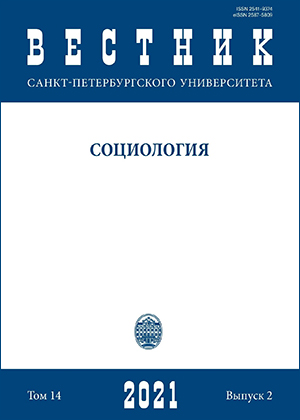Methodological diversity in Russian sociology: An analysis of research on values
DOI:
https://doi.org/10.21638/spbu12.2021.201Abstract
Methodological diversity is a condition for the development of sociology since the complexity of social reality does not allow adhering to one universal scientific paradigm. At the same time, the nature of methodological diversity in research is an indicator of the alignment of forces of agents in the field of science. Hence the research question arises — how is the influence of the external contour of science (business, public organizations, media, politicians, etc.) manifested in the methodology used by the authors of highly cited articles on values? The work is of qualitative design and the empirical base was formed by the texts of 42 of the most cited Russian articles on the issues of values posted on the RSCI platform in 2016–2019 and indexed by international scientometric databases (Scopus, Wos CC). The choice of articles on the study of values as an empirical object for assessing the nature of methodological diversity in sociology is explained by the complexity and multilevel nature of this phenomenon, and the existence of various approaches to its study, which provides ample opportunities for various methods and techniques. The research optics was the structuralist concept of the inner and outer contours of science. Analysis of the texts of articles showed that the quantitative methodology dominates (29 out of 42). In these studies, the signs of the pressure of the outer contour of science are most pronounced. The least pressure is experienced by authors of works in qualitative design, but there are very few studies in the sample of highly cited articles (2 out of 42), and the topic of values in them is optional. Promising areas for the continuation of the research are related to the analysis of the phenomenon of imitation in the process of producing scientific knowledge and its impact on methodological diversity.
Keywords:
sociology, values, methodology, field of science, structuralism
Downloads
References
References
Downloads
Published
How to Cite
Issue
Section
License
Articles of "Vestnik of Saint Petersburg University. Sociology" are open access distributed under the terms of the License Agreement with Saint Petersburg State University, which permits to the authors unrestricted distribution and self-archiving free of charge.




